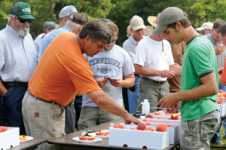Stone Fruit: Ahead Of The Curve

According to UsingEnglish.com, the idiom “Ahead of the curve” has the following definition: “Similar to ‘ahead of the pack’, ‘ahead of the curve’ literally refers to your position on the statistical bell curve, where the top of the curve represents the median, average result. By being ahead of the curve, you represent the top percentile of results that either has advanced skills or understanding that sets you apart.”
As a fruit grower, perhaps you are a novice who just began growing fruit as a hobby in your retirement — or maybe you are a fourth generation farmer with a lifetime of experience. Whether you are a rookie or a veteran, a key to long-term success is the humble acknowledgement that none of us is all knowing.
Steps For Success
So what makes the difference between successful and struggling operations? Is it luck, fate, determination, or inheritance? One thing I have observed over the last 30 years of working with fruit growers is that those who have a passion to learn and get involved are often ahead of the curve.
First, be a good student. As a regular subscriber to this magazine, you are already on the right track — provided you are reading it! Seek out and read trade magazines, Extension publications, research reports, government documents, books, etc. Literature that relates to your crop(s) of interest can be readily found online. Build a library of valuable resources that you can refer to when necessary and take note of innovations that may be worth considering. Keep a notebook to record thoughts, observations, questions, and ideas and refer to this often. Record both mistakes made and lessons learned (so as to not repeat the mistakes).
Third, build a relationship with your local, state, and national government officials. Many branches of state and federal government seek and require stakeholder input for various decisions that they make that can affect your operation. Familiarize yourself with legislation or regulations that are being proposed and express your informed voice to the appropriate person. As a result of the 2008 Farm Bill, federal research grants for specialty (i.e., fruit) crops exist that may require industry-matching funds. Be willing to invest with your peers to help bring some of these federal dollars to your state/region to do meaningful research that can help your operation in the future. Some of these programs also require grower advisory panels. Consider serving on such a panel by volunteering or agreeing to serve if asked.
Fourth, travel to see what other fruit growers are doing — in your state, other regions of the U.S., and even internationally. You can do this on your own, with a group of grower friends, or even as part of an organized tour through a grower organization. Although climate, cultivars, and other factors may differ considerably by region, many variables may be similar — reducing labor inputs, increasing efficiency of operations, sustainable practices, etc. One such grower organization that sponsors tours and educational programs is the International Fruit Tree Association (http://ifruittree.org).
Finally, as you review the aforementioned recommendations, you may conclude that you are already doing all of these things. If so, congratulations, because you are ahead of the curve! But remember the saying, “Everyone who exalts himself will be humbled, but the one who humbles himself will be exalted” (Luke 18:14, English Standard Version). So be a lifelong learner and take time to share with others about what you love.










